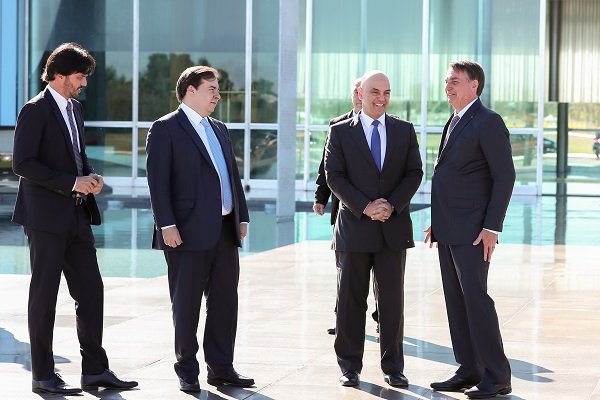On Tuesday (16/08), Minister Alexandre de Moraes took office as president of the Superior Electoral Court (TSE). In his new position at the TSE, Moraes will command the Electoral Justice during the October general elections. During his inauguration Moraes made a speech in defense of the electronic voting machine and the Brazilian electoral system. He also criticized the spread of false information (fake news) and stated that freedom of expression is not “freedom to destroy democracy”.
Important Guests
Moraes made the speech in front of President Jair Bolsonaro and former presidents Luiz Inácio Lula da Silva, Dilma Rousseff, Michel Temer and José Sarney.
Main Points of Moraes’ Speech
Among the main points of the speech of the new president of the TSE were:
- defense of the electronic voting machine and the electoral system
- defense of democracy as the only political regime in which power emanates from the people
- differentiation between freedom of expression and “freedom to destroy democracy”
- criticism of fake news and disinformation
- criticism of hate speech
Another Episode of a Long-Lasting Institutional Crisis
Minister Alexandre de Moraes and Bolsonaro have been protagonists of an institutional crisis that began back in 2020 and that has been dragging itself until this year. Moraes’ inauguration became another episode of this moment of instability.
Divergencies between the Executive and the Judiciary powers about strategies to be implemented started during the pandemic. While some Governors wanted to implement general isolation measures, the Federal Government’s intention was to reject them and to focus on specific groups. The stalemate led to a debate about who had the authority to implement measures to fight Covid. The dispute was settled by the STF, which ruled that states and cities have the power to enact measures themselves. Even though the decision recognized that the central authorities could also draw up nationwide strategies, the STF ruling was seen as an act of interference by the Federal Government.
The opening of the “Fake News” inquiry by the Supreme Court also promoted an increase in the tension between the Federal Executive and the Judiciary. The STF opened a case to investigate the spread of fake news regarding the court and its ministers. Several supporters of President Bolsonaro were questioned. In response, a series of protests promoted by President supporters requested the shutdown of the STF. Following the protests, the court opened the so-called “Antidemocratic Acts” inquiry, to investigate the acts and politicians connected to them. The inquiries led to the arrest of two President’s allies, the Federal Deputy Daniel Silveira and the former Federal Deputy Roberto Jefferson.
The dispute gained momentum after Congress rejected the printed vote constitutional amendment (PEC). The PEC was supported by Bolsonaro and his allies, who accused the existing electronic ballot of being open to fraud. Superior Electoral Court (TSE) President Roberto Barroso, who is also a STF minister, refuted the idea, arguing that the current system was totally secure. According to the TSE, the President’s public allegations that the electronic system was fraudulent were disinformation and it requested the STF to investigate. STF Minister Alexandre de Moraes accepted the request, and Bolsonaro himself started to be investigated under the “Fake News Inquiry”.
Bolsonaro filed an impeachment request against Alexandre de Moraes in the Senate and threatened to prepare one against Barroso, claiming that the ministers’ actions went beyond their constitutional rights. In September 2021, the request was rejected by the Senate.
The apex of this crisis was reached on September 7th, 2021, Brazilian Independence Day, when thousands took to the streets in acts pro and against the government in the 27 Brazilian capitals. The opposition demanded the President’s impeachment. Pro-government protesters requested the printed vote and the shutdown of the STF. resident Bolsonaro went himself to 2 events. During the events, he vehemently criticized the STF and Minister Moraes, stating that he would no longer comply with the minister’s decisions, which would be considered a crime.
At the time, the crisis was placated by former President Michel Temer. He helped Bolsonaro to write the “Declaration to the Nation”, a pacification statement in which he indicated that he never had any “intention to attack any of the powers”.
However, in 2022, the proximity to the country’s general elections and few other events seem to have fueled the conflict. As the elections gets closer, Bolsonaro restarted to criticize the country’s electoral system and the electronic voting machines, as well as the electoral and supreme courts. Furthermore, he granted presidential pardon to one of his allies, Federal Deputy Daniel Silveira, who had been sentenced by the STF to 8 years and 9 months in prison and the loss of political rights. Finally, he promoted a meeting with foreign diplomats to criticize the Brazilian electoral system and state that it was fraudulent, even though no evidence was shown.




